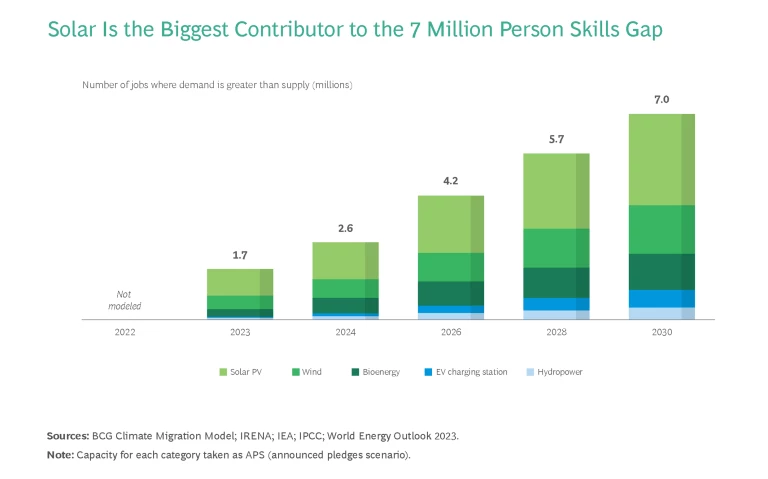There is a critical shortage of green energy workers with the right skills in the right place to advance global decarbonization efforts , according to new research from the BCG Henderson Institute.
BCG has calculated the skills gap in the green economy will rise to 7 million by 2030. This green skills gap is especially acute in solar, wind, and biofuels technologies—key pillars of the energy transition .
Read more
The So What
A lack of 7 million green energy workers by 2030 could lead to a temperature rise of 0.1°C by delaying progress on the construction of renewable assets for clean energy, according to study co-author Tanya Mondal, a project leader at BCG. Many countries have committed to reaching net zero CO2 emissions by 2050 as part of global efforts to limit temperature rises to 1.5°C above preindustrial levels.
“Closing a global 7 million green skills gap by 2030 is possible. What makes it challenging is a mismatch between geography, skills, and timing,” says Johann Harnoss , a BCG Henderson Fellow focusing on innovation and global talent.
“People are not where they are needed most, the ones that are in the right place still have meaningful work and don’t feel the urgency to move, and those who move into green energy find that they need entirely new skills. Large-scale upskilling is a key part of the solution, so is skills-based legal migration,” Harnoss explains. (See the exhibit.)

In countries like Germany and the United States, where unemployment is relatively low, broadening the talent pool will be especially important.
Examples of jobs that will be in demand include:
- Solar panel installers
- On- and offshore wind farm operators
- Welding and metal technicians in large-scale solar energy plants
- Technicians in fire protection and occupational safety
- R&D engineers for solar and battery technologies
“Topics such as sustainable finance, infrastructure, and technology innovation are rightfully top of the agenda at New York’s Climate Week and COP28. But the people dimension tends to be overlooked. Fixing this will be key to meeting the world’s net zero targets,” says Janina Kugel, BCG senior advisor on people and co-author of the study.
Five million of the 7 million jobs that are at risk of being unfilled are in the top 10 heaviest carbon-emitting economies, underscoring the importance of plugging the gap.
Now What
Governments should:
- Fund and scale training programs to upskill and retrain workers in green skills. BCG estimates that about 40% of the required workers will need only limited training. An example of a successful re-skilling program is the $17m fund set up in the UK to retrain 4,000 oil & gas workers. However, other reskilling programs are often quite expensive and don’t always scale well.
- Build partnerships between countries in a way that benefits both origin and destination country. For example, this can be achieved by investing in the vocational training of workers in their home country, and creating a pathway for them to then access visas and work elsewhere. Early programs, for example between Nepal and Germany, show promise but require access to impact-based financing to scale.
- Consider an integrated migration and visa strategy to attract global talent . Existing visa schemes such as H-2B in the US have often been effective in meeting temporary needs for companies and can offer people wages that are significantly higher than available at origin. However, such circular programs often don’t exist for green economy workers or are too small to deliver impact elsewhere.
Organizations should:
- Start the journey by seeing it as a change management effort that requires top management attention and involvement. This means a more global mandate—and the accompanying support—for human resources teams to attract talent. This often requires an upgrade in human resources capabilities to identify talent across the world, digitally vet their skills and then integrate these workers into local teams.
- Create a more global job market. Companies can do so either internally or via partners, by creating digital cross-country talent and upskilling platforms for green jobs. Companies should also make green jobs more attractive through competitive compensation, flexible working hours, and upward career mobility.
The green skills gap should not only be seen as a key growth constraint in the green economy, but also as a chance to share new economic opportunity for millions of workers with families and communities locally and globally, Johann Harnoss says.
This article is based on more extensive research on the green energy worker shortage that is available upon request from the authors Johann Harnoss , Tanya Mondal and Janina Kugel.






